Echoes review
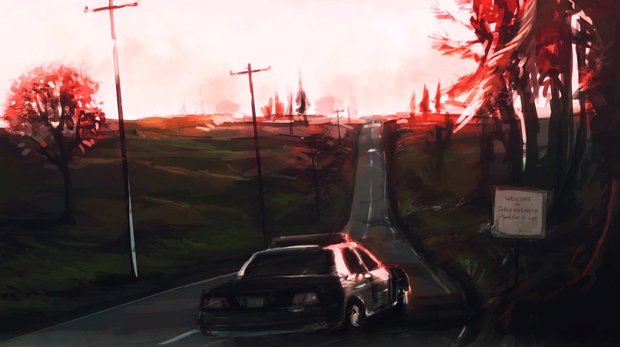
- 0 Comments
Compelling visual novel thriller bounces back with enhanced graphics and sound but same limited gameplay
Stories come in all shapes and sizes: songs, plays, movies, games, books, comics and graphic novels. Echoes is an interactive version of the latter, a visual novel presenting a small-town mystery through an ever-evolving hand-drawn visual style. Its compelling tale and eccentric cast make you forget that there’s very little gameplay involved, though it's questionable whether they'll be enough motivation to start all over to try for one of the other endings.
Six months ago, NYPD detective Ricky Fox traveled to the town of Greenhearth, Oregon to investigate the presumed suicide of his dear friend Arthur Petrovski, the town doctor. Ricky is writing down his story after the fact, and functions as both the main playable character and the narrator, commenting with lots of foreshadowing on what you experience throughout the game’s five chapters.
French developer Nova-box has released several visual novels over the years, but the PC and Switch versions of Echoes represent a return to the studio’s debut adventure, first released episodically a decade earlier exclusively for mobile devices. It’s a conspiracy-filled mystery/thriller treading into horror territory that might feel familiar to TV shows like Twin Peaks and The X-Files. The basic premise of this remade version is similar to its predecessor’s, but the game has been significantly overhauled with a totally rewritten script and enhanced graphics and sound.
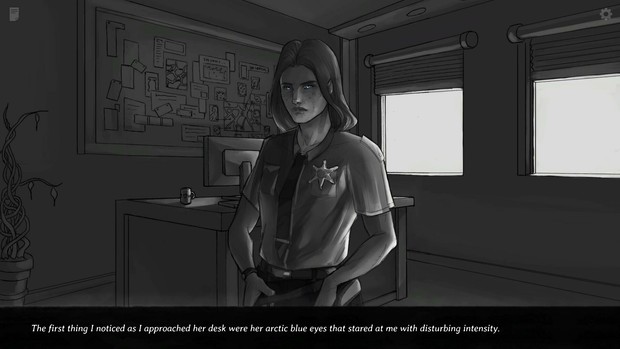
The biggest selling point of Echoes is its graphic novel style. The artwork is stunning and seems to come straight out of graphic novel series like The Walking Dead. It starts off with monochromatic grayscale screens that try to dazzle you with a rare flash of color for specific elements – blood on the wall or a character’s “arctic blue eyes” as described by Ricky – but each subsequent chapter looks slightly more stylistic, symbolizing Ricky’s mental state as he tells the story. By chapter four, the grayscale look has been fully replaced by completely black-and-white images similar to Frank Miller’s Sin City. Then in the final chapter, everything is suddenly colored in, resembling a more typical adventure game’s hand-painted style, resulting in five different graphical versions of the same characters and locations.
The character models have different versions of their own within a single chapter. Their images stand motionless in the foreground of similarly static backgrounds in typical visual novel style, though they can cycle through several varied expressions during a conversation: neutral, happy, angry, sad, upset, scared – every emotion fitting their personality has been taken into account.
Echoes is mainly a narrative game; basically a five-hour graphic novel you simply click through. Story is the most important aspect here, and it seems the developers didn’t want to distract the player from it with too much audio. The only music you’ll hear consists of some compelling piano tracks during transitional scenes and major events. Otherwise, accompaniment is completely absent when you’re actually playing. This makes for a very quiet experience, since the dialogue isn’t voiced either. There are loads of subtle sound effects if you really pay attention – birds, flowing water, engine noises, creaky doors and furniture, buzzing phones, cutlery and crockery in the diner – but there are still twice as many scenes where there’s nothing at all to hear besides you clicking your own mouse through lines and lines of text.
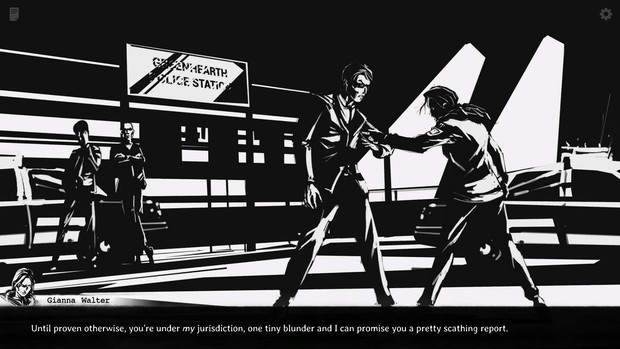
The game is fully mouse controlled. You have to click to advance the text – each line of dialogue appearing at the bottom of the screen in full – but a tap of the spacebar achieves the same result. Gameplay consists of asking people questions and choosing your own replies, as well as occasionally searching locations for clues in traditional adventure game fashion. New evidence and information gained from one character can offer new dialogue options with others. Echoes keeps a complete transcript of all conversations, which can be accessed by clicking the file icon in the top left of the screen. Beneath all the dialogue choices is an “Investigate” button, which works as a “travel” and “action” button, providing a list of places you can search and other people you can question.
It’s these characters that carry the story. Early on, Ricky discovers that ten of his doctor friend’s patients were involved in a mysterious “incident” many years ago, which might also be the reason why he died. There’s Liz, the waitress in the local diner; Pedro, garage owner and mechanic; homeless old man Raymond; former security guard Terry; eccentric dandy Oskar; and several others. Next to the patients, there’s also local sheriff Gianna Walter and hotel manager Ernest Bull, both ready to offer Ricky help and advice – if you decide to trust them, that is.
Pretty soon, Ricky discovers that all the doctor’s patients used to work at the same “institution” and they all have repressed memories of what happened there. As their memories slowly return and they are about to blab, a mysterious figure appears and the body count begins to climb in a way that reminded me a little of Agatha Christie’s And Then There Were None. This murder mystery in itself would have been exciting enough, but then the writers throw in strange human experiments to give the whole affair that extra edge.
The game is not without fault, however, which is particularly disappointing in a remake. There’s a regular at the local diner you can question, but when you go there the waitress might tell you he just left. But when you look at the list, the option to question him is still there, and when you click it, the waitress will talk to you as if you just walked into the diner again, offering you coffee after coffee.
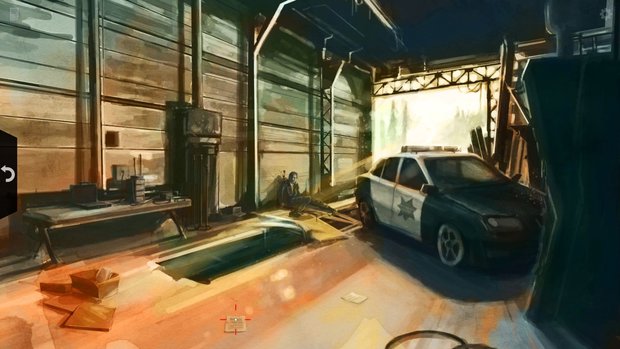
There are no inventory puzzles and you don’t have to manipulate any objects, solve riddles or use codes. When you need to search a location, the cursor changes into a radar display, a slowly beeping, outwardly rippling circle that quickens when you get near a clue and turns red when you’re right on top of it, pretty much hidden object style. Some clues are fairly well concealed in the background, but usually you can immediately spot what you need to find by taking a good look at the scene in front of you. There are generally only two or three pieces of evidence to find in a particular location, like notebooks or memos, and Ricky will always prompt you when there’s nothing left to discover.
Throughout his narration, Ricky will also suggest the next step in your investigation, so you don’t really have to do any thinking for yourself. You can simply follow Ricky’s advice and travel the very linear route through the mystery, where a click of the mouse is the equivalent of turning the page of a graphic novel. And yet…
Very subtly interwoven into the narrative are decisions you can make that you probably aren’t even aware you’re making – nothing so obvious as in Telltale’s “choices matter” franchises. It was only after reaching the final chapter, when things really turn upside down in the plot, that I looked back at all those conversations I had and realized which behavior the writers had taken into account to offer not only four possible endings, but one of four paths through the entire final chapter, which seem to play out only slightly differently. While I truly enjoyed the story and was genuinely wowed by how the final chapter was put together, as an investigator the ending didn’t particularly fill me with a feeling of accomplishment.
If there’s a significantly different outcome available, I didn’t try to find it myself. If you want to do things differently and aim for another ending, you’ll have to start a completely new game from scratch, as you can’t save manually when you anticipate a fork in the road. There isn’t even an option to continue from your chapter of choice. Instead, your progress is recorded automatically only when you exit. I was suitably perplexed by the story’s twists and turns throughout, but it wasn’t so amazing as to inspire an entire new playthrough. (Then again, I hardly ever replay games simply to get a different ending.)
Final Verdict
The different graphical styles throughout the game’s five chapters might not fully distract you from the sparing use of music and sound effects, but if you like a good mystery/thriller with a horror edge to it that keeps you guessing, the characters and their stories here will certainly pull you in. Echoes definitely isn’t for those looking for a typical puzzle-solving adventure game, but if you want to spend a few hours clicking through an interactive graphic novel with some light adventuring sprinkled in, making conversational choices along the way that subtly impact the outcome of the story, you’ll be solidly entertained the first time through and may even decide it’s worth coming back for more.
Hot take
Echoes presents an intriguing mystery through a gorgeous progression of graphical styles, albeit with little to do besides clicking through dialogues and finding the occasional hidden piece of information and making subtly impactful choices.
Pros
- Compelling mystery with an eccentric cast of characters
- Each chapter has its own altered graphic novel art style
- Four possible endings can inspire multiple playthroughs
Cons
- No voices and limited music
- Very light on actual gameplay
- Too much hand-holding by the narrator through an already linear story
Johnny played Echoes on PC using a review code provided by the game's publisher.


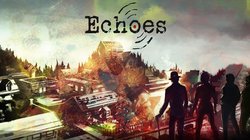








0 Comments
Want to join the discussion? Leave a comment as guest, sign in or register in our forums.
Leave a comment